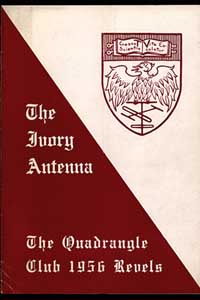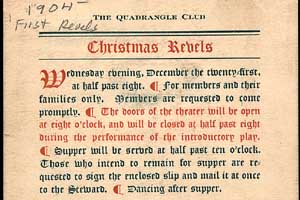Quad Club Revels to perform in Rosenheim/Ashenhurst’s swan song
By Seth SandersNews Office
 Pictured above is the program for the first Revels production, “The Ivory Antenna,” for which Ned Rosenheim wrote the script. Below is a program from 1981, titled “Taking Stock.” Both images are from Special Collections’ University historical manuscripts collection.   Also from the archives of Special Collections is an invitation to the very first Revels show in 1904, highlighting a Christmas production. |
“Why does Johnny read Kant?” “Plow up the campus!” “What did the coed say to the sailors?” “Maximize profits and let the devil take the hindmost!” After many revues with such colorful themes, this year will mark a century since the Quadrangle Club Revels first lampooned the University in its annual showcase of faculty and community talent.
After a dormant period lasting from the 1960s until the end of the millennium, producers Lee Behnke, Director of the Undergraduate Latin Program in Classical Languages & Literatures, and Helen DeGroot and Jean Meltzer, veterans of past Revels performances, revived the tradition of comedic vignettes and musical parody in 2001.
This month’s 100th anniversary show will be the last one scripted by the now-legendary team of Ned Rosenheim, the David B. and Clara E. Stern Professor Emeritus in English Language & Literature and the College, and Bob Ashenhurst, Professor Emeritus in the Graduate School of Business.
The Revels productions have waxed and waned over 100 years, with some shows performed for one night in the private Quadrangle Club, and others running for several weekends in Mandel Hall.
Audiences could see well-known campus figures in full costume as they sang, danced and performed satirical skits.
Recent performers have included James Redfield, the Edward Olson Distinguished Service Professor in Classical Languages & Literatures and the College; David Bevington, the Phyllis Fay Horton Distinguished Service Professor in the Humanities and the College; and Michael Behnke, Vice President and Dean of College Enrollment.
Among the past revelers were intellectual giants such as Robert Streeter, the Edward L. Ryerson Distinguished Service Professor in English Language & Literature, who claimed his most notable lyric––a spoof on the 1955 phonics book Why Johnny Can’t Read––was “Why Johnny Reads Kant;” University President Robert Maynard Hutchins, who portrayed a football player; and future U.S. Supreme Court Justice Antonin Scalia, who depicted a young heartthrob with a charming musical voice.
A brief survey of past scripts and programs suggests two repeated themes, which may really be one: sex and lowbrow culture, or, the vulgar.
Rosenheim commented that by reviewing the last 100 years of Revels, “You could extract a notion of the issues, concepts or habits that invited parody over the course of the University’s history.
Frequently the essential plot was the corruption of the academic enterprise. If you take a basic Aristotelian notion of comedy—suffering on the part of a victim who deserves it—your natural targets are likely to be academic stereotypes, self-righteous, stuffy, so you can vulgarize them—painlessly, again, as Aristotle says,” Rosenheim said.
“‘The Ivory Antenna’ was the first one I did. I had been Director of Broadcasting and of the ‘University of Chicago Roundtable.’ At that point, Bob (Streeter) had been Dean of the College, and both of us were amused at the pressures toward popularization, so the plot had to do with a person hired for development purposes who turned the University into a broadcasting agency.
“One of the memorable things was when my assistant Lee Wilcox, initially coming out as an academic student of humanistic matters, accompanied herself on a homemade instrument and sang a heavy-handed, didactic folk song,” Rosenheim said.
By the end of the show she had “gotten with the program” and, accompanied by “hot” Jazz trumpet, came out singing, “Let’s do it (let’s make a song).” The show, Rosenheim noted, “has never been lewd, though I can think of a couple of shameful double entendres.”
Behnke explained that this year’s revue will be the last one with original words and music by Rosenheim and Ashenhurst, the final collaboration of a brilliant team.
The Friday, Jan. 30 production, which will include complimentary wine and a cash bar, will begin at 8 p.m. The cost is $20 per person. The Saturday, Jan. 31 show, which is $65 per person, will include a cash bar at 5:30 p.m., dinner at 7 p.m. and the show at 8 p.m.
Both performances are open to the public, and discount tickets for students will be available Friday, Jan. 30. For more information or reservations, contact Cassandra Swift at the Quadrangle Club, (773) 702-2550.
![[Chronicle]](/images/sidebar_header_oct06.gif)